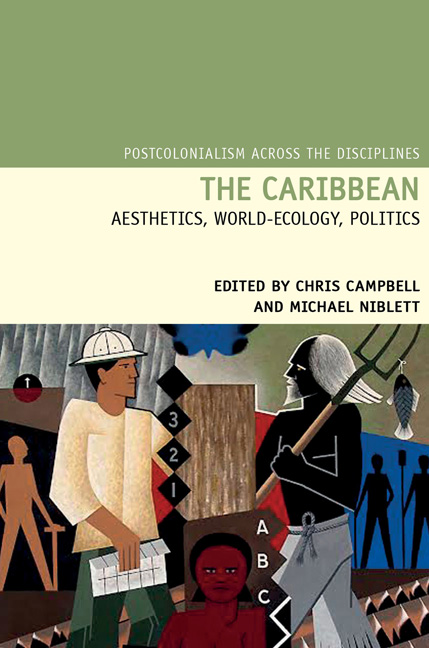Book contents
- Frontmatter
- Contents
- Acknowledgements
- Introduction: Critical Environments: World-Ecology, World Literature, and the Caribbean
- Prologue: The Brutalization of Truth
- Catastrophes and Commodity Frontiers
- 1 The Political Ecology of Storms in Caribbean Literature
- 2 Zombies, Gender, and World-Ecology: Gothic Narrative in the Work of Ana Lydia Vega and Mayra Montero
- 3 Gade nan mizè-a m tonbe: Vodou, the 2010 Earthquake, and Haiti's Environmental Catastrophe
- Ecological Revolutions and the Nature of Knowledge
- Economies of Extraction: Restructuring and Resistance
- Epilogue: Tingaling
- Notes on Contributors
- Index
1 - The Political Ecology of Storms in Caribbean Literature
from Catastrophes and Commodity Frontiers
- Frontmatter
- Contents
- Acknowledgements
- Introduction: Critical Environments: World-Ecology, World Literature, and the Caribbean
- Prologue: The Brutalization of Truth
- Catastrophes and Commodity Frontiers
- 1 The Political Ecology of Storms in Caribbean Literature
- 2 Zombies, Gender, and World-Ecology: Gothic Narrative in the Work of Ana Lydia Vega and Mayra Montero
- 3 Gade nan mizè-a m tonbe: Vodou, the 2010 Earthquake, and Haiti's Environmental Catastrophe
- Ecological Revolutions and the Nature of Knowledge
- Economies of Extraction: Restructuring and Resistance
- Epilogue: Tingaling
- Notes on Contributors
- Index
Summary
‘Find the storm's swirling core, and understand’ – Derek
Walcott (1969, 69)
The opening lines of The Tempest, in which the Boatswain proclaims that the tempest overturns the authority of the monarchy – ‘What cares these roarers for the name of King?’ – capture the carnivalesque conditions opened up by storm-events, during which ordinary mores and hierarchies are suspended. The Latin root of ‘tempest’ is tempus, which denotes a time of occasion and opportunity, and in early modern literature was related to the word ‘temper’, evoking organization according to a scheme of natural elements (Herron, 2007, 97). Prospero raises the elements at the opportune moment to cause the ship to wreck and catalyse a crisis of authority. The tempest thus embodies the kairotic moment, where nature in turmoil engenders chaos, the dissolution of the current social order – though order and authority are reconstituted by the conclusion of the play. The classical image of kairos was often depicted as scales balanced on a knife point or a winged figure signifying the fleeting rhetorical moment when appropriately chosen words could have the most power to temper a course of events which previously seemed immutable (Beehler, 2003, 74–88).
The Sophists conceived kairos as requiring an irrational choice, with the knowledge that to temper events is to close off one path in favour of another. Although kairos enables the breaking up of antitheses and the emergence of something new, it is not inherently good, but requires human effort to determine what it will engender: whether rebellion or capitulation (86). Kairos is the sudden manifestation of hitherto unseen gaps or aporiai: it is, in Sharon Beehler's analogy, like a merry-go-round which demands readiness in order to alight: ‘When the rhythms and spaces align between child and moving platform, then they can come together. The separate continuity of the child's existence temporarily matches and accedes to the movement of the merry-go-round. In order for this to occur, a gap must be opened to allow passage from one state of being to another, and yet we glimpse both simultaneously’ (75). The kairotic moment thus often intersects with the spectral, like the appearance of Hamlet's father, whose ghost manifests the secret history of regicide, or the pre-colonial history of Sycorax's isle intimated in Caliban's speech.
- Type
- Chapter
- Information
- The CaribbeanAesthetics, World-Ecology, Politics, pp. 25 - 45Publisher: Liverpool University PressPrint publication year: 2016



